

Evo Morales. Juan Evo Morales Ayma, (born October 26, 1959), popularly known as Evo (Spanish pronunciation: [ˈeβo]), is a Bolivian cocalero activist and politician, who has served as President of Bolivia since 2006.
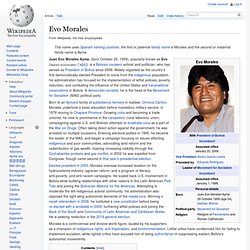
Widely regarded as the country's first democratically-elected President to come from the indigenous population, his administration has focused on the implementation of leftist policies, poverty reduction, and combating the influence of the United States and transnational corporations in Bolivia. A democratic socialist, he is the head of the Movement for Socialism (MAS) political party. Born to an Aymara family of subsistence farmers in Isallawi, Orinoca Canton, Morales undertook a basic education before mandatory military service, in 1978 moving to Chapare Province. Growing coca and becoming a trade unionist, he rose to prominence in the campesino (rural laborers) union, campaigning against U.S. and Bolivian attempts to eradicate coca as a part of the War on Drugs.
Political Rise[edit] Che Guevara. Ernesto "Che" Guevara (Spanish pronunciation: [ˈtʃe ɣeˈβaɾa];[7] June 14,[1] 1928 – October 9, 1967), commonly known as el Che or simply Che, was an Argentine Marxist revolutionary, physician, author, guerrilla leader, diplomat, and military theorist.
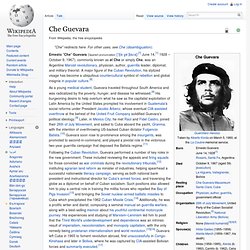
A major figure of the Cuban Revolution, his stylized visage has become a ubiquitous countercultural symbol of rebellion and global insignia in popular culture.[8] Early life A teenage Ernesto (left) with his parents and siblings, c. 1944. Subcomandante Marcos. Subcomandante Marcos or Subcomandante Insurgente Marcos is the nom de guerre used by the main ideologist, spokesperson and de facto leader of the Zapatista Army of National Liberation (EZLN), a Mexican rebel movement fighting for the rights of the indigenous peoples of Mexico.
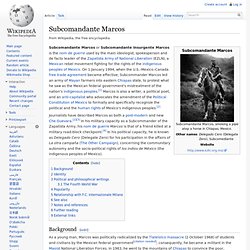
On 1 January 1994, when the U.S. –Mexico–Canada free trade agreement became effective, Subcommander Marcos led an army of Mayan farmers into eastern Chiapas state, to protest what he saw as the Mexican federal government's mistreatment of the nation's indigenous peoples.[1] Marcos is also a writer, a political poet, and an anti-capitalist who advocates the amendment of the Political Constitution of Mexico to formally and specifically recognize the political and the human rights of Mexico's indigenous peoples.[2] Background[edit] Identity[edit] Subcomandante Marcos (center, wearing brown cap) in Chiapas In an interview with García Márquez and Roberto Pombo, Marcos spoke of his upbringing: "It was middle class.
Nelson Mandela. Nelson Rolihlahla Mandela (/mænˈdɛlə/;[4] Xhosa pronunciation: [xoˈliːɬaɬa manˈdeːla]; 18 July 1918 – 5 December 2013) was a South African anti-apartheid revolutionary, politician, and philanthropist who served as President of South Africa from 1994 to 1999.
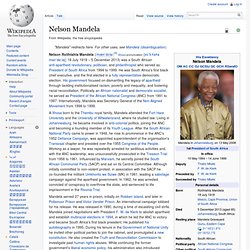
He was South Africa's first black chief executive, and the first elected in a fully representative democratic election. His government focused on dismantling the legacy of apartheid through tackling institutionalised racism, poverty and inequality, and fostering racial reconciliation. Politically an African nationalist and democratic socialist, he served as President of the African National Congress (ANC) from 1991 to 1997. Internationally, Mandela was Secretary General of the Non-Aligned Movement from 1998 to 1999. Mandela was a controversial figure for much of his life. Nelson Mandela Centre of Memory. Hugo Chávez. Hugo Rafael Chávez Frías (Spanish pronunciation: [ˈuɣo rafaˈel ˈtʃaβes ˈfɾi.as]; 28 July 1954 – 5 March 2013) was a Marxist[1][2][3][4][5] Venezuelan politician and the President of Venezuela from 1999 until his death in 2013.
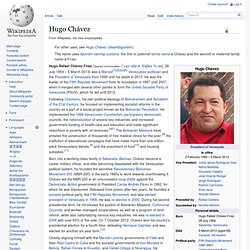
He was the leader of the Fifth Republic Movement from its foundation in 1997 until 2007, when it merged with several other parties to form the United Socialist Party of Venezuela (PSUV), which he led until 2012. Following Chavismo, his own political ideology of Bolivarianism and Socialism of the 21st Century, he focused on implementing socialist reforms in the country as a part of a social project known as the Bolivarian Revolution. Born into a working-class family in Sabaneta, Barinas, Chávez became a career military officer, and after becoming dissatisfied with the Venezuelan political system, he founded the secretive Revolutionary Bolivarian Movement-200 (MBR-200) in the early 1980s to work towards overthrowing it.
Early life[edit]